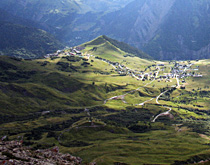Ryan Woodring drifts off to sleep with the sound of tinkling bells in the distance. He has grown accustomed to the sound, as well as the thumping noises that come at the back of the cabin during the night. It is cold, even though it is July. He is wrapped in five blankets, and he is alone in the mountains.
A more discerning soul might not even call it a cabin; the structure has one open face. Tonight, one bell is getting louder and louder as Woodring falls asleep after his dinner of cheese and other farm-grown foods.
He helped make the food himself, as he has been doing for weeks, living on two farms in France. Beginning at a farm in the foothills of the Pyrenees, he tended the vegetables alongside a French couple as a WWOOFer—a member of World Wide Opportunities on Organic Farms, which matches people who want to till the soil with farmers in a foreign country.
Working on the farms is one new way for college students and adventurers to get to Europe, Asia, Africa, and other places on a budget. One of those "adventurers" was Matt Gross, the frugal travel writer for The New York Times, who toured Europe this past summer for the newspaper and ended up at the same farm as the Carnegie Mellon student. Gross even mentioned Woodring in his article.
Woodring, an art major, had decided to trade labor for living space as a cheap way to brush up on his French, which he studies as a minor. Besides saving money, the fourth-year student liked the adventure and the bragging rights WWOOFing would give him. "It's one of those things you want to tell a story about before you even do it," he says. "It unexpectedly became something I was learning from every single day. I lost interest in the story I was going to tell when I got home."
He expected an adventure, but he might not have expected to be a shepherd. As he was sleeping near the flock of sheep at the second farm that was further up in the hills, it was his job to ward off wolves and to track down stray sheep lost in the fog.
As the sound of the bell and the clop of hooves awaken him, he notices that one sheep has escaped the electric fence and wandered into his shelter. He shoos it out, but it returns, so he lets it lay down to sleep. As he is about to drift off again, he can't imagine a more peaceful place to spend July.
—Michelle Bova (HS'07)




